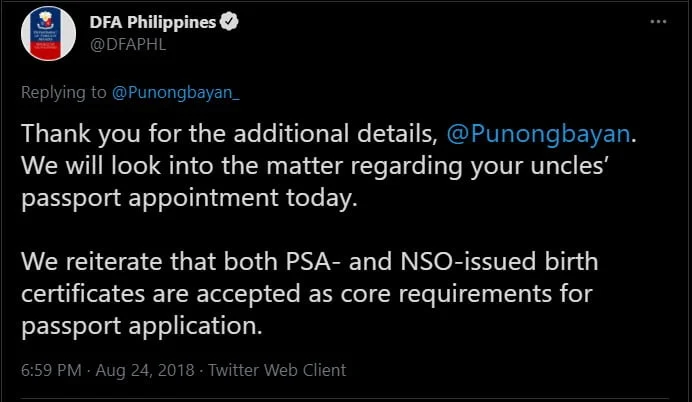In 2013, the late President Benigno Aquino III signed the Philippine Statistical Act into law. Also known as Republic Act 10625, this law merged the National Statistics Office (NSO), National Statistical Coordination Board (NSCB), Bureau of Labor and Employment Statistics (BLES), and the Bureau of Agricultural Statistics (BAS) into one and became the Philippine Statistics Authority (PSA).
The merger made PSA the central statistical authority of the Philippines. All civil registry documents (i.e., birth certificate, marriage certificate, death certificate, CENOMAR) are now issued by the PSA.
Understanding the lifelong validity of NSO birth certificates
Maybe yours is tucked in a box or filed for safekeeping. The odds are that you have one: a birth certificate issued by NSO (before becoming PSA).
PSA already clarified in a press statement that the birth certificate issued by the National Statistics Office (NSO) — before the merge — has no expiration and is still a valid document. It is the same birth certificate issued currently by the PSA. The only difference between PSA and NSO-issued birth certificates is the logo.
PSA also made it clear that even when they changed some features of the security paper (SECPA) — color, font, etc. — to prevent counterfeit documents, it does not mean that the previously issued copies using the “old SECPA” are no longer valid. The facts of birth contained in the “old SECPA” are still the same and do not expire unless there have been authorized annotations.
Republic Act 11909 ensures permanent validity
While PSA already made it clear that both PSA and NSO-issued birth certificates are technically the same and don’t expire, it is still the decision of the implementing agency if they require a PSA-issued birth certificate with the latest security paper (SECPA). That’s beyond PSA’s control.
This resulted in inconvenience and unnecessary expenses for ordinary Filipinos, especially for those job applicants who need to submit a copy of their birth certificates during the hiring process.
The PSA currently charges Php 155 for an authenticated copy of the birth certificate and Php 365 if it’s delivered.
This is where the Republic Act 11909 or the Permanent Validity of the Certificates of Live Birth, Death, and Marriage Act would help.
To quote, it’s “An act providing for the permanent validity of the certificates of live birth, death, and marriage issued, signed, certified, or authenticated by the Philippine Statistics Authority (PSA) and its predecessor, the National Statistics Office (NSO) and the local civil registries, and the reports of birth, death, and marriage registered and issued by the Philippine Foreign Service Posts.”
In other words, it will prohibit government agencies and private companies from requiring to submit a newly-issued birth, death, or marriage certificate with the latest security paper, or certified within the past six (6) months.
School requirement adjustments post RA 11909
PSA made a ceremonial signing of the implementing rules and regulations of Republic Act 1109 in October 2023. With that, private and public schools are now prohibited from requiring parents to submit a PSA-issued birth certificate if the learners already have an existing NSO-issued birth certificate.
Previously, the Department of Education (DepEd) issued Memorandum No. 0714 to ensure alignment of the following:
- A PSA-issued birth certificate should be used for student enrollees with no existing profile.
- In the absence of a PSA birth certificate, receiving schools should also accept a birth certificate issued by the local civil registrar or a barangay certification containing the learner’s basic information.
- Submission of the birth certificate should only be done once during the duration of the basic education.
Role of NSO birth certificates in passport issuance
The Department of Foreign Affairs (DFA), in a tweet last 2018, clarified that an NSO-issued birth certificate is still accepted as a requirement for new passport applications and renewal (if applicable). DFA will also accept birth certificates issued more than 6 months ago.

This was before the approval of the Permanent Validity of the Certificates of Live Birth, Death, and Marriage Act of course. Thanks to this law, NSO birth certificates should now be considered valid as a passport requirement.
Key takeaway: NSO birth certificates are valid for life
The approval of the Republic Act 11909 should make it very clear that the NSO-issued birth certificate is still valid and doesn’t expire regardless of its issuance date.
Anyone who is found guilty of violating this law can be imprisoned for one to six months and a fine of not less than Php 5,000.
References:
- Philippine Senate. (n.d.). Republic Act No. 11909. Retrieved January 4, 2024, from https://legacy.senate.gov.ph/republic_acts/ra%2011909.pdf
- Philippine Statistics Authority. (n.d.). Ceremonial signing of the implementing rules and regulations of Republic Act No. 11909. Retrieved January 4, 2024, from https://psa.gov.ph/content/ceremonial-signing-implementing-rules-and-regulations-republic-act-no-11909
- Department of Education – Cavite. (2018). [Memorandum No. 0714]. Retrieved January 4, 2024, from https://depedcavite.com.ph/wp-content/uploads/2018/06/Memo-0714.pdf
- Republic of the Philippines. (2013). Republic Act No. 10625. Retrieved January 4, 2024, from https://www.officialgazette.gov.ph/2013/09/12/republic-act-no-10625/



